Engineering Humility: Why ‘I Don’t Know’ Accelerates Your Career
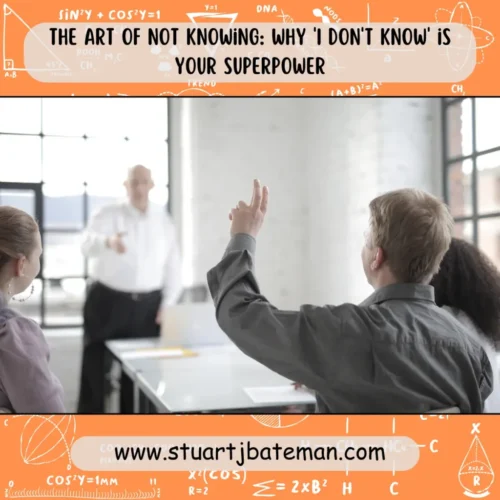
The engineers who advance fastest aren’t those who pretend to know everything—they’re the ones brave enough to admit what they don’t know and curious enough to learn it.
Senior Engineer Perspective
Engineering humility — the willingness to admit ‘I don’t know’—might seem like career suicide in a technical field. But as Danny Murphy, an automation engineer with over two decades of experience, explains:
“I used to be an arrogant fool who would constantly fall down on his own face because I was too proud to ask questions to others out of humility. Many engineers struggle with the type of narcissism that leads them to believe they can operate as an island, but modern technology is too complex for any one person and requires humility and collaboration.”
If you’re early in your career, you might think admitting “I don’t know” makes you look incompetent. Danny’s experience—and that of many successful engineers—proves the opposite. Your willingness to acknowledge knowledge gaps isn’t weakness; it’s your pathway to rapid growth and professional credibility.
Table of Contents:
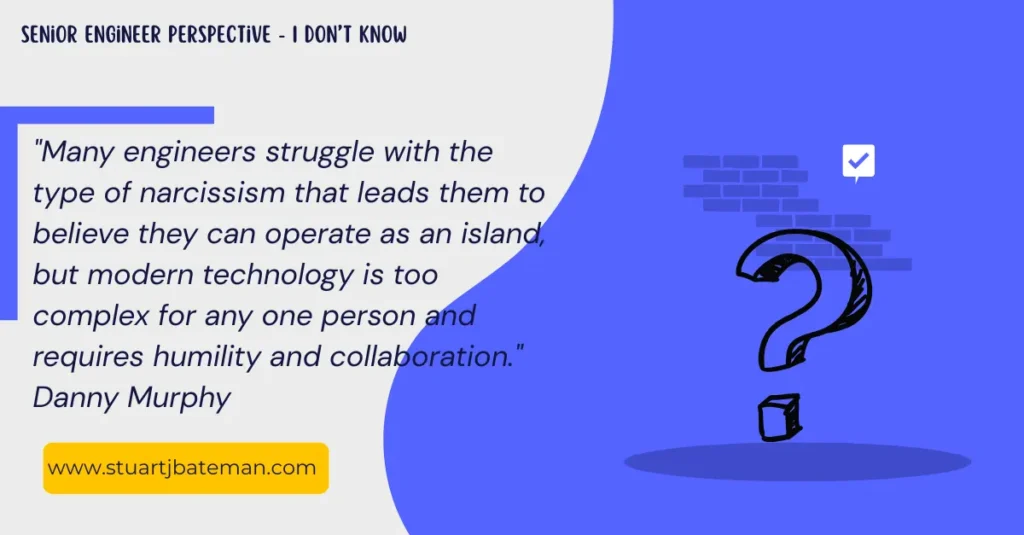
Engineering Humility in Practice: What You Can Do Now
Learning to say “I don’t know” professionally requires both courage and strategy. Engineering humility transforms how colleagues perceive you when you approach it systematically. Here’s how to turn this phrase into a career accelerator:
The Three-Part Engineering Humility Framework:
- Acknowledge honestly: “I don’t have experience with that specific application.”
- Show initiative: “Let me research the best practices and get back to you by tomorrow.”
- Follow through: Actually research, learn, and report back with insights.
Practice Scenarios for Students:
- In class: “I’m not clear on how this principle applies to [specific situation]. Could you walk through an example?”
- During projects: “I haven’t worked with this software before. What resources would you recommend for getting up to speed quickly?”
- In interviews: “I haven’t encountered that technology yet, but I’m curious about how it compares to [related technology you do know].”
The Knowledge Gap Inventory Exercise
The foundation of engineering humility starts with honest self-assessment. Create three lists:
- Know Well: Technologies, concepts, and processes you can explain to others
- Know Basics: Areas where you have fundamental understanding but lack depth
- Don’t Know: Skills, technologies, or concepts relevant to your field that you haven’t learned
Update this monthly. Your “Don’t Know” list isn’t a source of shame—it’s your learning roadmap that demonstrates engineering humility in action.
Strategic Question-Asking
Practicing engineering humility in team environments means asking the right questions:
- Preparation questions: “What should I understand about the system before we start troubleshooting?”
- Context questions: “Help me understand how this fits into the larger process.”
- Learning questions: “What would you have done differently if you were starting this project today?”
Building Your Support Network
Start identifying who to ask for different types of questions:
- Technical mentors: Senior engineers in your discipline who model engineering humility
- Process experts: Technicians and operators who work hands-on daily
- Cross-functional allies: Colleagues in related departments who understand integration challenges
Remember: The goal isn’t to become the person who knows everything—it’s to become the person others trust to find the right answers and ask the right questions.
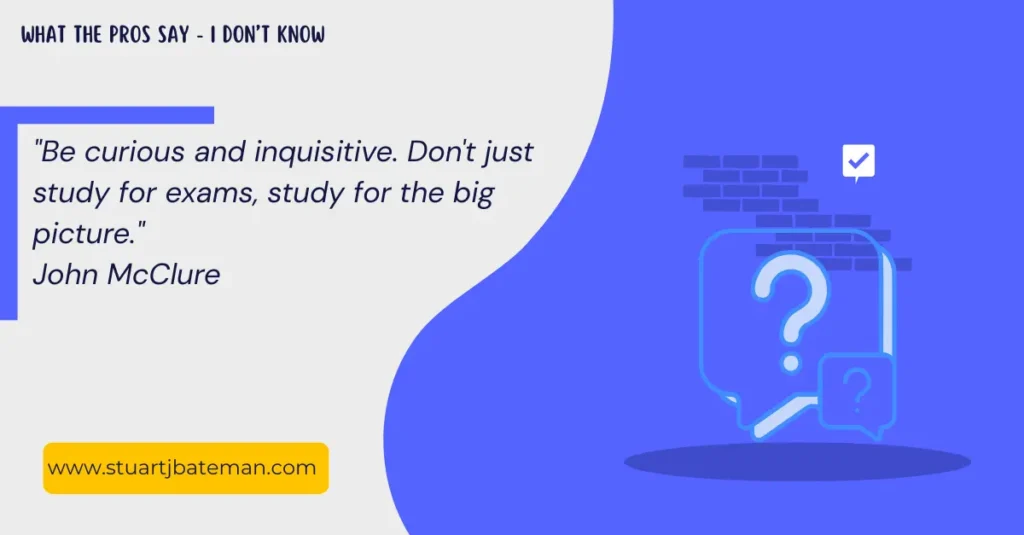
What Professional Engineers Say About Humility
Kyle Shropshire, a design engineer, emphasizes the learning power of questions that demonstrate engineering humility:
“I ask questions, a lot of questions, and then after that I ask some more.”
His approach has led to breakthrough insights, like learning about tool clearances from an assembler who had to modify his allen key because Kyle’s design didn’t leave enough room for installation.
Chris Stasiuk, now an engineering coach, reflects on the transformation that engineering humility brings:
“What is often missing is humility—understanding and accepting what you don’t know opens growth opportunities. Once you have that, communication, leadership, and emotional intelligence are skills that truly advance your career.”
The pattern is clear across experienced engineers: those who embraced engineering humility early accelerated past peers who pretended to have all the answers. Bug Meehan, a product designer, puts it perfectly:
“Stay curious, keep asking questions, and never stop learning.”
John McClure, an energy engineer, advises:
“Be curious and inquisitive. Don’t just study for exams, study for the big picture.”
His systematic approach to finding mentors—cold-calling licensed PEs until one responded—demonstrates how engineering humility opens doors that staying silent keeps closed.
Why Engineering Humility Matters for Career Growth
Early career engineering humility compounds into advanced career leadership. When you’re comfortable with knowledge gaps now, you’ll excel at:
Complex System Integration
Senior engineers regularly encounter technologies outside their expertise. Engineering humility differentiates professionals who make better decisions by saying “I need to learn more about this component” rather than those who guess and create problems downstream.
Team Leadership
Future project managers who model engineering humility create psychologically safe environments where team members share problems early instead of hiding them until they become crises. This leadership approach builds stronger, more innovative teams.
Client Relations
Engineering consultants and customer-facing roles require translating between technical and business domains. Clients trust engineers who demonstrate engineering humility by admitting limitations and committing to finding answers over those who bluff through explanations.
Innovation Projects
Cutting-edge work inherently involves unknowns. Engineers who embrace learning curves through engineering humility adapt faster to emerging technologies than those paralyzed by perfectionism.
The engineering humility superpower you develop now becomes the foundation for the strategic thinking, team building, and technical leadership your career will demand later.
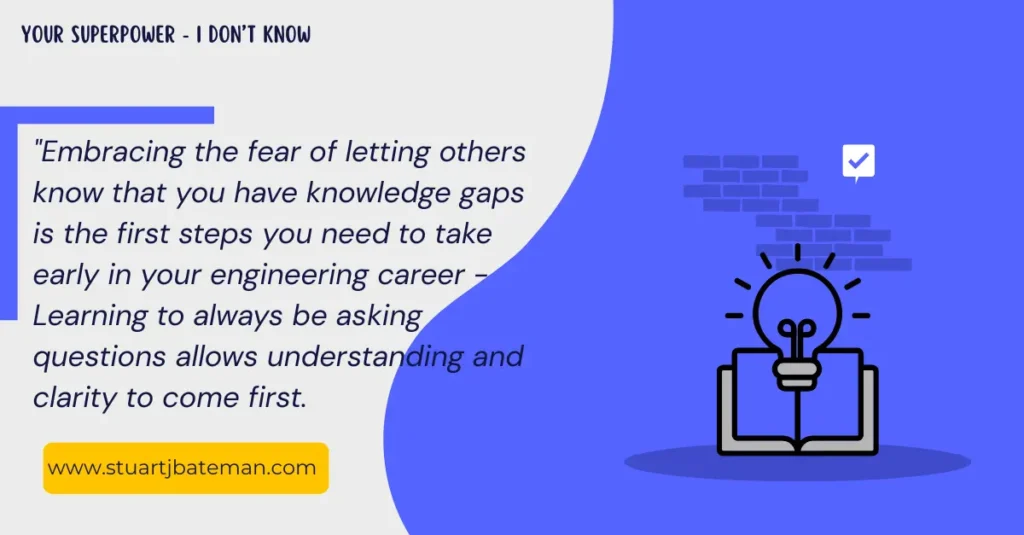
Your Next Step: Practicing Engineering Humility
This week, practice the three-part framework in a low-stakes situation. Choose one genuine knowledge gap related to your current coursework or project. Find someone knowledgeable in that area and say: “I don’t understand [specific concept]. Could you explain how it works or point me to resources that would help?”
Follow through on their suggestions, then report back with what you learned and one follow-up question. This completes the cycle and shows you’re serious about growing through engineering humility.
Track your experience: What felt uncomfortable? What surprised you about their response? How did following through change the dynamic?
Share Your Engineering Humility Experience
What knowledge gap are you most hesitant to admit? Has there been a time when asking for help led to an unexpected opportunity or insight? Share your thoughts—sometimes the questions we’re afraid to ask are exactly what others are wondering too.
Frequently Asked Questions About Engineering Humility
Q: How do you show humility in engineering without appearing incompetent?
Engineering humility means acknowledging knowledge gaps while demonstrating initiative to learn. Use the three-part framework: admit honestly, show learning intent, and follow through with research. This approach builds credibility rather than undermining it.
Q: What is the difference between humility and lack of confidence in engineering?
Engineering humility comes from strength—knowing your capabilities while recognising growth areas. Lack of confidence questions your overall abilities. Humility says “I don’t know this specific thing but I can learn it,” while lack of confidence says “I probably can’t handle this.”
Q: How does engineering humility help with career advancement?
Engineering humility builds trust, accelerates learning, and positions you as someone others want to mentor and promote. Leaders value team members who contribute honestly to problem-solving rather than hiding knowledge gaps that could derail projects.
Q: When should you admit you don’t know something in engineering?
Practice engineering humility when the stakes of guessing incorrectly outweigh the temporary discomfort of admitting ignorance. Always admit knowledge gaps before making critical decisions, when safety is involved, or when your assumption could waste team time or resources.
Q: How do senior engineers view humility in junior team members?
Experienced engineers appreciate engineering humility because it demonstrates coachability, reduces project risk, and creates opportunities for knowledge transfer. Senior professionals would rather work with someone who asks good questions than someone who makes assumptions and creates problems.
Resources (Internals) – Careers
Check out these interviews I conducted with 10 engineers you can find and chat to on LinkedIn:
- Danny Murphy – Automation Engineer
- Kyle Shropshire – Design Engineer
- Chris Stasiuk – Engineering Coach
- Bug Meehan – Design Engineer
- John McClure – Energy Engineer
And also check out these posts related to this topic:

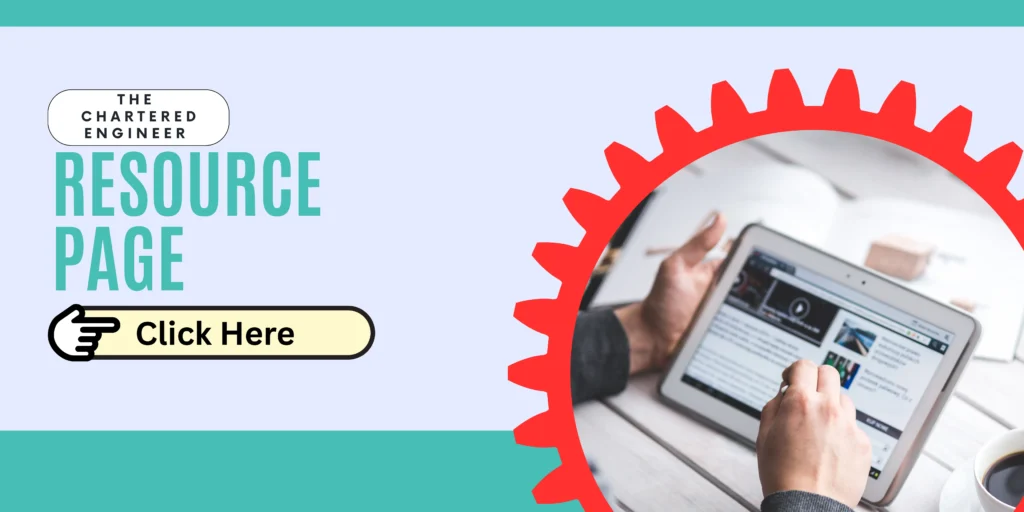
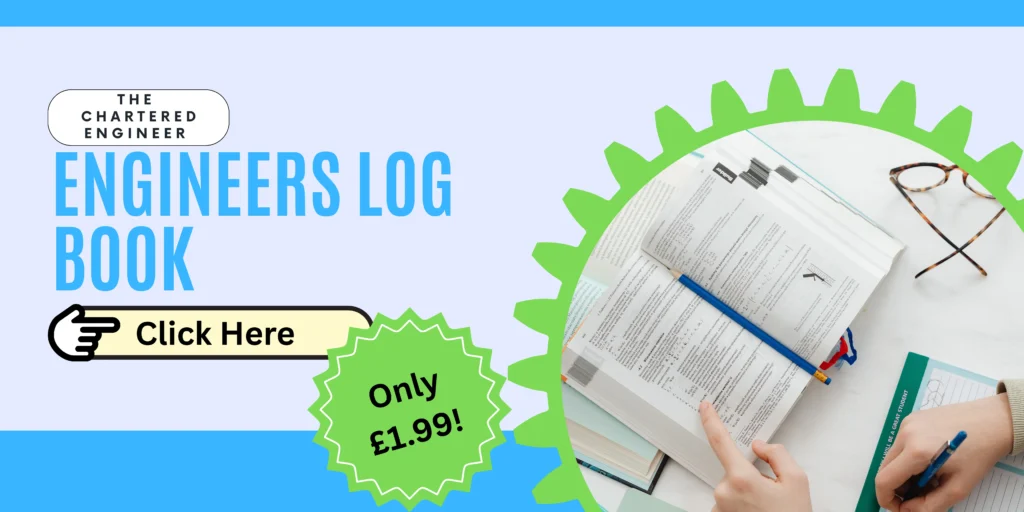
What are your thoughts? Have I covered everything or is there more you know and would like to share?
I’m always learning and improving this site and my blogs, so please feel free to get in touch with me via LinkedIn or this site to discuss any topics I have covered.
If you’re having trouble finding ways to progress check out these sites filled with free learning tools:


Discover more from The Chartered Engineer
Subscribe to get the latest posts sent to your email.